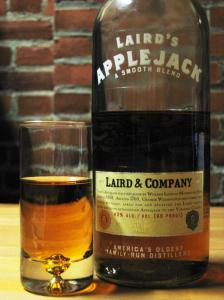When we discuss classic cocktails (or classic anything, really), heritage is a notion that is usually at the fore. What makes something classic, after all, is its ability to endure and affect society. When it comes to spirits, the top spot for American heritage is often attributed to bourbon, though we’ve discussed in the past that this is a post-prohibition phenomenon. Before prohibition all but wiped out the American liquor industry, rye whiskey was king. But before farmers and frontiersmen were able to turn wilderness into arable fields for grain, early American colonists drank applejack.
In the 1700s, water often wasn’t safe to drink without risking gastrointestinal armageddon, which is why wine and beer were served at almost every meal in Europe. In the newly formed American colonies though, booze was too expensive to ship from the homeland for all but the wealthy few. Grains were difficult to farm at first, but apples grew naturally and abundantly. Hence hard cider became the staple beverage of the workingman in 18th century America; and in New England, a happy byproduct of the harsh winters was freeze distillation, which concentrated hard cider down to the far more potent applejack.

Laird's Applejack
That’s why applejack is sometimes called apple brandy, because that’s essentially what it is. Where brandy is grape wine distilled down to a liquor, applejack is simply distilled cider or apple wine (the only difference between hard cider and apple wine is the alcohol content anyway, and the distinction becomes moot when you begin distillation).
As larger-scale rye and barley production became more economical in the late-1700s, whiskey began to edge out applejack as America’s spirit of choice, though it remained a popular ingredient in early cocktails. Today, there are only two commercially available brands of applejack that I can find.
The newcomer is Harvest Spirits’ Cornelius Applejack. Using updated distillation techniques on a small scale, Harvest Spirits is able to offer what is essentially the same beverage enjoyed by revolutionary soldiers, but better quality. Unfortunately, however, the company’s small scale restricts their sales to within New York state.
Conversely, Laird’s Applejack is available from California to the New York Island, and beyond. In fact, Laird & Company just about has a monopoly on the applejack market and heritage. In 1780 Robert Laird established the newfound country’s first commercial distillery of any spirit. Here, Robert produced applejack from a recipe laid out by his ancestor, William Laird, a Scottish whisky distiller who emigrated to the new world in 1698.
